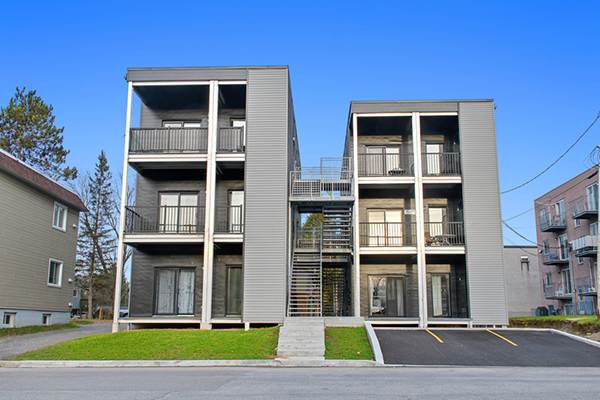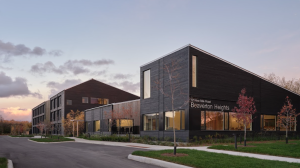It has taken some time for project owners and the building industry to recognize that modular construction in its various forms is a logical answer to Canada’s housing shortage.
However, there is progress. Prefabricated new homes, from single family to multi-unit residential, are popping up across the country.
Perhaps most promising is volumetric modularization. Large sections or even entire housing units are manufactured in a factory setting and then transported to the site for quick and efficient assembly.
Most modular units are made from wood and wood composites.
However, Construction Éco-bâtiment, a family-owned company in Brossard, Qué., wanted to explore new possibilities for volumetric modular and apply them to their multi-unit affordable housing project in Mont-Laurier, northwest of Montréal.
ÉcoTech Québec, a non-profit organization that mobilizes and represents stakeholders in Québec’s clean technology ecosystem, explains for several years, Éco-Bâtiment had been looking for a different construction method, one that would offer superior insulation to reduce operating costs and tenant expenses. Ideally, this method would not be based on concrete with its high carbon footprint or on wood with its longevity and health problems for occupants such as mold and warping. Furthermore, it would be a construction process that would create less waste materials sent to landfills.

Éco-bâtiment turned to ACAL System, a volumetric modular builder based in Québec that specializes in aluminium-framed units. ACAL units take advantage of aluminum’s lightweight, structural integrity and superior longevity, and combine it with a high-efficiency, LEED/Novoclimat pre-certified thermal envelope.
ACAL has completed over 200 LEED-certified projects across Canada. Its website currently shows a wide variety of tiny homes, duplex, triplex, quadruplex and eight-plex designs, each offering optional levels of completion.
The collaboration between Construction Éco-bâtiment and ACAL resulted in what Miguel Vaillancourt, president of Construction Éco-bâtiment, called “a world-first” — a six-unit, three-storey residential complex named Lofts de l’Aluminium.
The modules were built with such exact precision that the units were assembled onsite in just one day. While the efficiency of the assembly is impressive, equally important were the operational cost benefits made possible by choosing aluminum construction.
High levels of closed-cell insulation (EPS) were incorporated into the units; R42 in the walls, R50 in the floors and R70 in the roof. Together with triple-glazed windows, this has reduced heating and cooling costs for tenants by an estimated 50 per cent. Insurance costs are also reduced due to the higher fire protection offered by the aluminium. Over the longer term, the combination of aluminum and EPS means the structure will not rot, rust, decompose, or promote mold growth, resulting in a healthier indoor air quality for tenants.
From an embodied carbon perspective, the aluminum is produced in Québec using hydroelectricity, arguably the greenest power source in the world. Being lighter than typical wood-cellulose units, the aluminum/EPS volumetric units reduced foundation requirements and associated costs by about 30 per cent.
Vaillancourt estimates the overall completion time for the Lofts de l’Aluminium project was 60 per cent less than traditional building methods, including onsite detailing such as drywall joint finishing and painting and floor covering installation. However, ACAL has since improved its factory processes so that fully complete interiors can be delivered onsite in the future.
Lofts de l’Aluminium’s final cost was about $2.3 million, more than half of which came from the Québec Affordable Housing Program and AluQuébec. The project also won Écotech Québec’s 2024 “Eureka! Prize” in the Real Estate category.
ACAL has bigger projects in mind for the near future that includes four-storey rental buildings with 25 units and even six-storey residential projects. These are expected to benefit from the support of the Rio Tinto Fund and the Société de la Vallée de l’Aluminium.
“We build fast and we build well, according to the high standards towards which climate change and rising energy costs will bring the industry over the next five to 10 years, while remaining competitive with the cost of traditional construction,” said ACAL president Stefan Vuillemenot Perrey.
John Bleasby is a freelance writer. Send comments and Inside Innovation column ideas to editor@dailycommercialnews.com.








Recent Comments